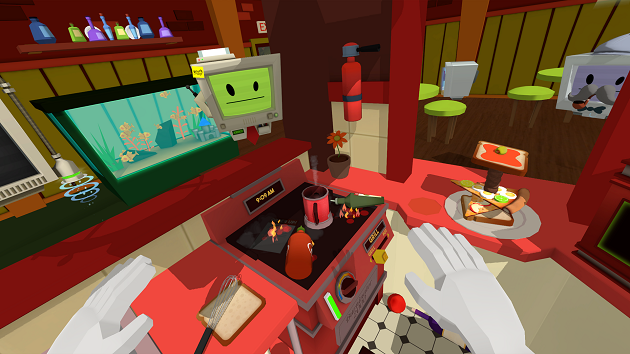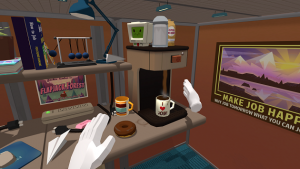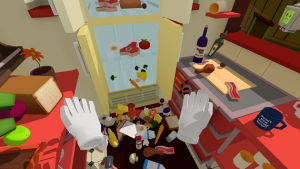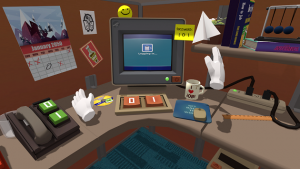Independent game development studio Owlchemy Labs has already made a name for itself in the virtual reality market. The Austin, TX-based company has brought Aaaa! to Google Cardboard and Oculus Rift and is now developing its first cross-platform game, Job Simulator, for PlayStation VR, Oculus Rift, and HTC Vive.
At the Vision VR/AR Summit, Alex Schwartz and Devin Reimer, the CEO and CTO of Owlchemy Labs, will share how they combined realistic physics with hilarious moments of physical comedy in their Job Simulator VR game – and brought it all to life across all three high-end virtual reality platforms. In this interview, Schwartz discusses the growth of virtual reality and the opportunities this new platform has opened up for game makers.
How have you seen virtual reality evolve over the years?
It’s quite amazing to see how virtual reality has progressed — even since the Oculus DK1 days. When I first received my DK1, I remember feeling like I was peering into the future. There was so much potential, and demoing it to friends and family was always a mind-blowing experience. Now I cringe when I see someone demoing a DK1 to unsuspecting players. We’ve become incredibly spoiled as the hardware has progressed an insane amount from the DK1 days to the current hardware.
What about virtual reality do you find fascinating?
There are so many aspects of virtual reality that continue to amaze me. I could write for days and days about all of the industries, including entertainment, that will be upended by VR and how VR can provide empathy beyond what we’ve ever conceived. I could write about how people assume VR is a solitary, isolating experience and how they’re dead wrong as the long-term future of virtual reality is a highly social experience that will allow people of all walks of life to interact, play, and learn from one another, and connect like never before. But it’s the effect VR has on game developers that gets me the most excited.
I know many game developers who have been building games for 20+ years. They’ve become jaded, cynical, and burnt out by the industry, lamenting the trend toward sequels, toward sameness, and toward stagnation instead of innovation. I’ve also seen these same people emerge from their first “good” VR demo wide-eyed, beyond excited, and borderline teary-eyed from the sheer potential of this new medium. I think that a technology that can take long-time cynics and fill them with pure child-like wonder again is something that cannot be ignored, and a path that I’m extremely excited to be pursuing.
Can you detail your VR project, Job Simulator?
Job Simulator is a VR launch title for HTC Vive, Oculus Touch, and PlayStation VR, which takes a tongue-in-cheek look at what it was like to do a job after robots have replaced all human jobs in the year 2050. Players can relive the glory days of work by simulating the ins and outs of being a gourmet chef, an office worker, a convenience store clerk, and other professions.
Job Simulator’s design plays to the strengths of today’s high-end VR setups. The game takes advantage of the ability to walk around a real-world space and interact naturally and intuitively with our actual hands using tracked controllers, while also feeling present in an entirely new place.
What was the development process like?
In our early experiments, we realized that manipulating objects with your hands was extremely fun and satisfying. We ended up building a game all about detailed, realistic physics interactions using your hands. When talking about our game that way, it seems like it would be a complicated or technical process to play it, but the magic of VR is that it’s the most accessible form of interacting with interactive content that’s been built to date. We’ve had a number of players who have never touched a video game in their lives and were instantly able to get into the kitchen scene in our Gourmet Chef job and start throwing around eggs, smashing wine bottles, and creating faux meals with no instruction.
How did Unity help with this cross-platform project?
There’s no way we would have been able to build Job Simulator for three platforms simultaneously without using Unity. We frequently reflect on the fact that we would have been screwed if we had been building for three platforms simultaneously and also building our own engine. At Owlchemy, we have 5+ years of experience building in Unity so it’s the engine we’re most comfortable working with and also the engine in which we can prototype the fastest. In VR, I think it’s absurdly important to have a very fast iteration cycle so that ideas can be prototyped, tested, and modified. When building for non-VR, we have 30+ years of game design precedent to draw from and when an idea is brought up, there’s a pretty good chance of understanding how it might feel and how it would fit into the overall design.
What did virtual reality open up creatively for your team?
In VR, everything is so new, any idea that’s seemingly good or bad has enough merit to at least be tried out in-engine. Being able to prototype and test out wild ideas and scrap them or move forward with them is key to being able to experiment and build quality content in VR. We’ve noticed that we’re having to be much more creative when building for VR as we’re constantly challenging our own expectations and building in a space where no standards are truly defined. As game designers, we’ve never had access to so much new technology all at once and the consumer launch of VR gives us an opportunity to build a game that utilizes multiple new input paradigms.
What activities do you do to stay relevant in this field?
As a team, we try to play as much VR content as humanly possible. Since it’s still such early days, we’ve been trying to remain in close contact with other developers building quality VR content and playing their early builds to remain in touch with the bleeding edge. Reading r/Oculus on Reddit also helps to stay up with the latest news. We also attend a ton of VR-focused conferences and speak on our experiences as well as absorbing others’ experiences. I personally feel that seeing postmortems and seeing early design failures can be more important than seeing the final results and successes of a team, as it’s the evolution of the design and development process that is most insightful to me. Overall we feel that the best way to stay relevant in this field is to continue to build, iterate, and learn from our successes and failures.
What was your first win that made you confident that you were doing the right thing?
In October 2014, we were invited to the Valve headquarters where they shared the details of their partnership with HTC and plans to create a commercial headset. After that meeting, we were convinced that standing VR with tracked hand input was going to change everything, and so we decided to build a new title to take advantage of hands and room-scale locomotion. In a 7-day game jam, we stumbled upon the early mechanics that would lead to Job Simulator. Once we had the ability to pick up, throw, manipulate and stack items, we had our first glimpse of how it felt to play around with accurate physics within VR. Feeling how fun that was confirmed that we were on the right path. While testing out various features during development, we would sometimes get lost in VR and spend 20 minutes playing around or trying to toss a tomato into a pot across the room in VR. It was then that we knew that we’d hit on something magical.
Where do you see VR five years from now?
Five years is an incredibly long time in this space. Four years ago, VR wasn’t even on our radar as we assumed consumer VR was just too far off. Since then, modern VR went from a prototype in Palmer Luckey’s garage to a commercial headset with high resolution, dramatically better lenses, low persistence, positional tracking, etc. We now also have the ability to stand up and move around with 1:1 tracked hands in VR. It’s hard to wrap your mind around how much we’ve advanced in only three years. This is why five years is such a long time for solid predictions.
One thing we are confident in is that VR will go mainstream. It will most likely follow a similar adoption rate to smartphones and will be extremely disruptive to almost every industry. The questions we are hearing right now from the general public are very similar to those at the beginning of smartphones. At that time, we would hear questions like, “Why would I need this?” or “It’s not something for me.” And in a period of five years that transformed into “This is something I cannot live without.”
What role do you see a cross-platform, cross-discipline conference like this playing in that future?
Our philosophy is that building cross-platform content will always have certain benefits, both for a company building content and for the overall industry. A conference that remains agnostic and brings together developers and competing platforms to the same room is an incredible feat that only a company like Unity can pull off. In my mind, Unity is the Switzerland of VR, and it makes total sense for them to bring all of these players into one room and let the conversations flow.
I’ve also found that I’m seeing less and less value out of conferences that are too general and try to do it all (generic entertainment conferences like CES / E3 or game developer conferences like GDC) due to the lack of focus. Conferences that tend to be more focused usually end up yielding better conversations and better experiences overall, for me, so I’m definitely excited for the Vision Summit.
Creatively, what do you see VR opening up for the games market?
I’ve heard a few VR developers claim that VR will completely overthrow the console gaming space in the next few years. I don’t believe that VR will upend the console gaming industry any time soon. I do think that VR will become the primary sector for gaming innovation in that we now have a wide-open space to invent brand new gameplay that was never possible before VR. I firmly believe that there are multiple new genres of games that have not yet been invented but will emerge as a result of the new interaction methods of VR. It’s also very possible that console gaming will enter a period of stagnation (or we have already arrived there, depending on who you ask), with VR offering new hope to a stagnating market.
What opportunities do you see across the mobile, PC, console and other platforms for VR?
I believe overall that games will become more accessible with the advent of VR. We’ve seen this with Job Simulator in that our parents and grandparents have had no problem picking up and mastering the interaction methods in the game, mostly because VR affords a more natural mapping of input. We have years and years of experience reaching out and grabbing items in the real world, and now this type of interaction comes through in a very natural way in VR. We no longer have to abstract our input in games by pressing a single button to represent an action (press X to interact, press B to crouch, hold Y to run, etc.) and with the removal of the majority of the buttons from input devices, we’re seeing that players with less gaming experience are having a much easier time picking up and enjoying our game.
Where do you see mixed reality fitting into this evolving market moving forward?
Time will tell. I think AR is quite a ways away from being at a quality level that consumers will want to use on a day-to-day basis, whereas I think VR is there today and will be exploding in 2016.
-END-
The post Owlchemy Labs Explores Multi-Platform Virtual Reality Development appeared first on VRFocus.


















